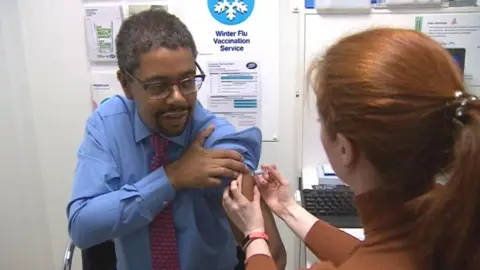Free flu vaccines for care staff and more younger children
Free flu vaccines are now being offered to all primary school pupils and two and three-year-old children in Wales.
The latest winter flu campaign, launched in Torfaen later, will also see staff in residential and care homes offered free vaccines.
Last year saw the highest number of cases since the 2009 flu pandemic, with more than 16,600 seen by GPs.
Public Health Wales said the vaccine was the "single best way to protect yourself".
More than 820,000 flu vaccines were given by NHS Wales last year.
Developments this year include:
- All primary school children are now eligible for a free nasal spray flu vaccine - so it now includes those older than seven too. Also, children aged two and three years
- Staff in adult care homes can have a free vaccine
- Pregnant women, people with long-term health conditions and everyone over 65 are also eligible for a free vaccine, along with unpaid carers and first aid volunteers
- All health and social care staff with direct patient contact are also recommended to have the vaccine
- Delivery of supplies of certain flu vaccines to GP practices and community pharmacies will be staggered between September and November - but this is not due to any shortage of vaccine.
- It is planned that everyone will be offered vaccination before mid-December when flu typically starts to circulate.
Last year in Wales, uptake of flu vaccine in vulnerable groups under 65 was nearly 48%, although below the target.
Vaccine uptake for those aged 65 and over was 68.8% last year - the highest on record but still below the target.
Health Secretary Vaughan Gething AM launched the campaign when he received his vaccination at a pharmacy in Cwmbran.


Mr Gething said on take-up rates that "we can always do better".
"That's not actually about me being concerned about government targets because we could better protect our public if we get more people to take up the jab," he added.
He said it was about changing the culture, to take flu seriously.
"Flu spreads very easily, especially among children," he said. "By extending the programme to include all primary school age children this year we hope to protect them from catching flu, and also prevent them spreading it to others in their family and in the community who may be vulnerable."
Last winter was the worst for nine years, with excess mortality and 2,680 patients with confirmed flu went to hospital - 192 in intensive care.
 PA
PAHOW DOES THE VACCINE WORK?
- Vaccines take six months to produce - inoculated into eggs - after being prepared from seed viruses selected by the World Health Organisation to try to match those circulating up to last February
- Flu viruses change as they circulate around the world - these can be tracked genetically and studied in the lab, as to how they react to our blood serum and immunity
- The recommended vaccines contain viruses chosen to best match what they predict will circulate in the winter - although it is not an exact science
- Most people will be offered two A virus strains and two B strains in their vaccination; elderly people will get two A strains and a B strain and a component designed to make it more effective for this age group.
- Over 10 years, vaccines have prevented 40% to 60% of flu, but there may be a strain which the vaccine is not so effective with - and this happened last year
- Children are not only vulnerable but spreaders of flu, so vaccinating one child can prevent up to 10 adults catching it
- Colder temperatures make it easier for flu to circulate - the body's reaction to the cold makes it easier for viruses to get inside us.

Dr Richard Roberts, head of the vaccine preventable disease programme at Public Health Wales, said: "Vaccination against flu is the best way of preventing it. We have no alternatives really, you can try to reduce spread, you can give anti-virals when somebody becomes infected, but by far the best way is to vaccinate."
He added that people with chronic conditions or compromised immune systems are more than 10 times more likely to suffer severe outcomes from influenza "and we want to see even more people protected this year".
While most NHS flu vaccines are given in GP surgeries, it is also available for adults in many community pharmacies across Wales.
